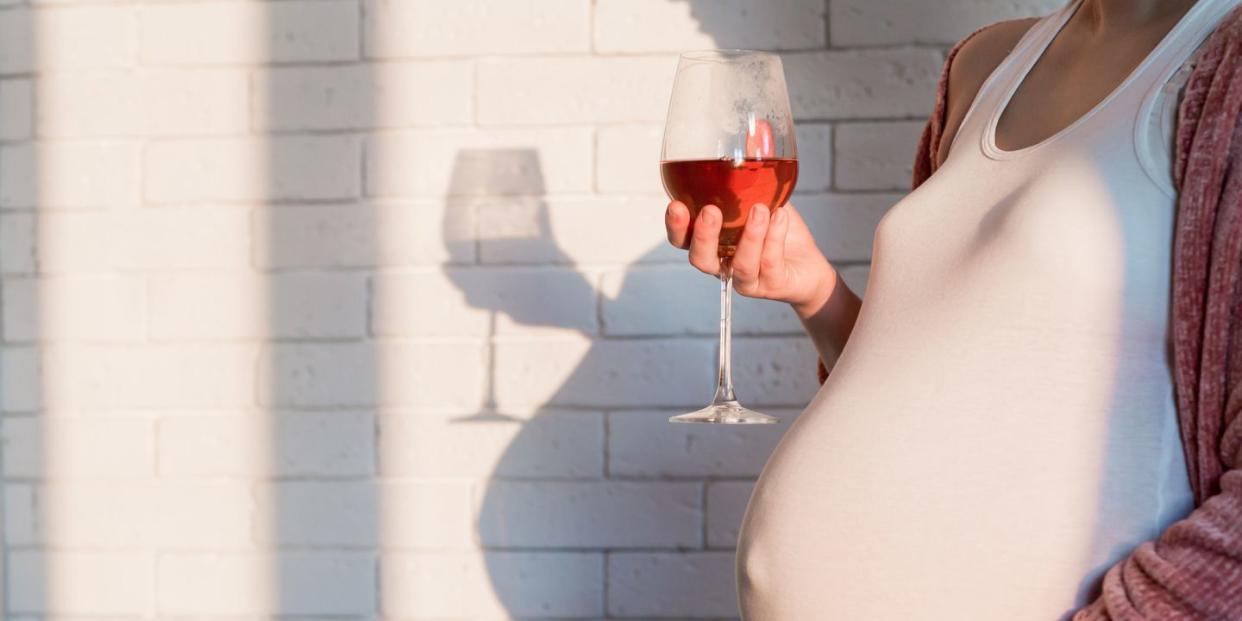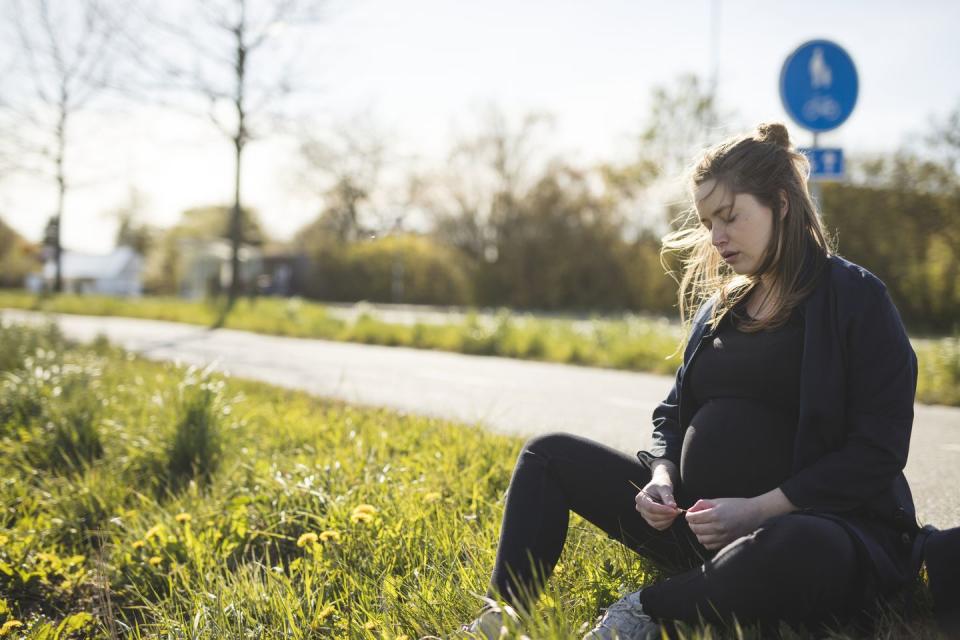Stop Policing Women’s Bodies: Recording Alcohol Consumption During Pregnancy Is Wrong

It is a truth universally acknowledged (begrudgingly) that your body ceases to belong to you in pregnancy. For one, the baby growing inside it stakes a claim over your eating habits, the supplements you’re taking, whether or not you can continue working out or, in some cases, even walking in the manner that you're used to. So far, so reasonable.
But beyond that, you begin to notice that people other than the tiny one in your uterus feel as though they have dominion over you physically. Hordes descend to rub your bulging stomach without permission – the sort of uninvited touching that would seem like a #MeToo moment if you weren’t a walking pizza oven. Comments on your breasts and size abound and everyone – literally, everyone – proffers unsolicited commandments about what you should and shouldn’t be doing with yourself.
So, news that a proposal by the National Institute of Health Care and Excellence (NICE) to ask doctors to record women’s alcohol consumption during pregnancy is being pushed as a top 'priority' feels, sadly, unsurprising, but let’s be clear: a line is being crossed.

The proposal is, of course, a bid to slow the rates of foetal alcohol syndrome (FASD), an irreversible, lifelong condition and one that prospective mothers, without question, need to take seriously.
But keeping blanket tabs on a woman’s every glass of Chablis isn’t appropriate. Firstly, as Clare Murphy, director of external affairs at the British Pregnancy Advisory Service (BASP) points out in the Guardian: ‘Women do not lose their right to medical confidentiality simply because they are pregnant.’ It might feel like you surrender autonomy over your gestating body, but you don’t. Beyond where there are signs of harm or cruelty to your baby, it is your right to make (evidence-based, one hopes) decisions for yourself, not your doctor’s or anyone else’s.
And before anyone suggests that a drink constitutes harm, let’s take a look at that evidence. If you’ve read Emily Oster’s brilliant book Expecting Better, you’ll know that studies on alcohol consumption during pregnancy vary wildly and are, in many cases, deeply flawed. Beyond knowing that vast quantities of alcohol will cause FASD, we know very little else definitively. Oster posits that, having pored over every relevant study from the ten years preceding the book, the most we can reliably say is that binge drinking during pregnancy is bad, but slowly sipping on a glass or two of wine is likely totally fine, with your body able to metabolise the alcohol content long before it reaches the placenta.
This is horrific and extremely worrying. Emily Oster demonstrated in her survey of the literature that up to a drink a day in the second and third trimester has been shown safe. But also: women have the right to behave how they want during pregnancy. https://t.co/3mL5HzPqX0
— Dr Charlotte Lydia Riley (@lottelydia) September 16, 2020
If you want another approach to the ‘alcohol is harmful’ argument, consider this: while the effects of gentle alcohol consumption are hotly contested, we’re conclusive that stress is bad for a developing baby. Cortisol (the stress hormone) ‘causes reduced growth and modifies the timing of tissue development as well as having long lasting effects on gene expression [in a foetus],’ says neuroendocrinologist and Professor at Edinburgh University, Megan Holmes. So, if the odd half-carafe of vin rouge is going to help you keep your blood pressure and cortisol levels down, it might arguably lead to a healthier pregnancy. And therefore, doctors recording every sip on the basis that drinking is a sinister act, is erroneous.
Much of the problem is that women still aren’t trusted to make sensible decisions for themselves. Having spoken to my own GP and midwife on the subject, it seems that health professionals largely subscribe to the idea that some wine here and there especially after the first trimester isn’t an issue, but that women can’t be trusted to have one glass and it not lead to 10, and therefore encouraging abstinence is safer. If you’d spoken to me as a 20-year-old university student, I might have agreed that limits are hard to observe and drinking is too fun to care about them. But if you’re asking me as a 33-year-old woman carrying my first child, whether I’m about to put limitless party-time ahead of the health of my unborn baby, I’m going to show you the door.

There are even worse implications of policing women in this way. If the data captured is to be shared, with NICE or others, it’s not just a gross violation of patient-doctor confidentiality, but could have a whole host of other consequences, such as unfairly affecting future chances of accessing health or life-insurance, for either the mother or the child. And where is the comparative policing of parental partners? If you’re noting down a mother’s evening tipple, you’d better also be keeping track of the husband who does a line of cocaine to start his day, follows it with a few ciders and often turns to violence throughout his partner’s pregnancy. Or how about recording all the substances consumed while the bloke was producing the sperm that made the pregnancy possible?
There is a gendered discrepancy between how bodies are treated in medical settings. Historically, women’s bodies have either been abused or ignored entirely during the production of scientific knowledge, with the ‘white male [coming] to be the prototype of the human research subject'. The knock-on effect is that conclusions drawn about cause and effect, and much medical advice that becomes received wisdom, is largely ignorant of how women’s bodies actually operate. One only need read about the alleged mass hysterectomies taking place in ICE camps in the US to know that, in 2020, the female anatomy still lacks respect. Until this changes, we’ve no business enforcing further monitoring or control measures on women during pregnancy.

Unquestionably, binge drinking during pregnancy is an issue. There is clear scientific evidence of the implications for the foetus, but it is also an indicator of poor maternal mental health and should be carefully observed and carefully handled. Binge drinking during pregnancy is also uncommon and fears over it shouldn’t lead to changes in practice that could have huge consequences for everyone. Regardless of whether, after reading all the evidence that we currently have on offer, you consider moderate drinking during pregnancy to be safe or not, it is still fundamentally a breach of women’s rights to control, record and distribute information about her body without her consent. You can believe that abstinence is best and still respect an adult woman’s right to make decisions for herself.
Like this article? Sign up to our newsletter to get more articles like this delivered straight to your inbox.
In need of more inspiration, thoughtful journalism and at-home beauty tips? Subscribe to ELLE's print magazine today! SUBSCRIBE HERE
You Might Also Like


